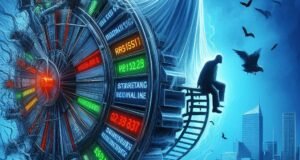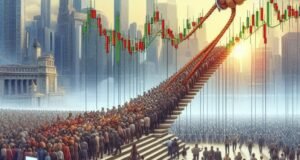Picture prop trading as an international airport—gigantic runways of capital, flights of opportunity taking off every second, and ambitious traders arriving from every corner of the world. In the past, each hopeful pilot (trader) would stand in a long immigration line, handing paper credentials to stern officers (human recruiters) who asked the same questions again and again.

Now imagine a smart, transparent, lightning-fast customs gate made entirely of code. There are no human officers stamping passports; instead, an invisible neural network scans each traveler, authenticates their story, and routes them to the correct terminal—all in the time it takes to inhale.
That gate is Remote Trader Vetting AI, the machine-learning guardian now transforming prop trading recruitment.
From Manual Interviews to Predictive Passes
The traditional interview process resembled a detective drama: phone calls, spreadsheets, personality quizzes, and gut-feel judgments. It was slow, costly, and—above all—biased by human mood swings. With Remote Trader Vetting AI, the drama shifts to predictive analytics:
- Data Passport Control
• Applicants upload trade logs, brokerage statements, screen recordings, and even click-stream data.
• The AI parses thousands of rows per second, verifying that positions were real, timestamps intact, and slippage reasonable.
• Fake or doctored records trigger an automatic “red-flag” exit lane—no awkward confrontation required. - Flight-Simulator Challenges
• Instead of answering “What’s your edge?” on Zoom, candidates fly a simulation coded with live market firestorms—flash crashes, news shocks, illiquid gaps.
• The AI tracks micro-behaviors: reaction latency, order-size adjustments, risk-of-ruin curves.
• Every keystroke becomes a feature in the model, building a prop trading readiness score far richer than any résumé. - Biometric Turbulence Detection
• Optional wearables capture heart-rate variability and micro-facial tension while trading.
• Machine-learning models correlate physiological stress with drawdown phases, flagging pilots likely to panic-sell.
• Candidates who maintain composure through simulated storms receive a calm-pilot badge on their digital passport.
Why Prop Firms Love the New Gate
- Speed Without Sacrifice – A global wave of applicants can be filtered in hours, not weeks, while accuracy improves because algorithms never get tired, hungry, or impressed by charisma.
- Bias Reduction – Gender, accent, and geography vanish from the decision loop; only quantified skill and discipline remain. Prop trading finally taps talent pools from Lagos to Lahore on equal footing.
- Dynamic Bench Strength – Because the vetting AI keeps learning, today’s borderline candidate might auto-requalify next quarter after new practice rounds—no manager has to remember their name.

The Traveler’s Perspective
For remote traders, the process feels like a video-game checkpoint instead of a grilling interview:
- Transparent Metrics – After each test, dashboards reveal exactly where reflexes lagged or risk rules broke. Traders gain actionable feedback, not vague rejections.
- Portable Credentials – Pass the gate once, and a blockchain-signed certificate lets you fast-track at partner prop desks—no need to “start from scratch.”
- Meritocratic Motivation – Success hinges on consistent performance, not networking or eloquence. In this airport, numbers speak for themselves.
Challenges in the Control Tower
- Adversarial Fakes – Just as counterfeiters target passports, some applicants may deploy AI to spoof trade data. Vetting algorithms must evolve with forensic watermarking and cross-exchange verification.
- Privacy Turbulence – Collecting biometrics or keystrokes raises ethical questions. Progressive prop trading firms now offer opt-in tiers, balancing insight with consent.
- Model Drift – Markets mutate; yesterday’s winning reaction time may be tomorrow’s lag. Continuous model retraining—and human oversight—remains essential.
A New Boarding Pass for Prop Trading
Remote Trader Vetting AI doesn’t eliminate the human element; it elevates it. Recruiters shift from paperwork clerks to air-traffic strategists—focusing on culture fit, capital allocation, and mentorship. Traders, freed from subjective interviews, compete on pure craft.
In this new airport of prop trading, the runway is longer, the gates are wider, and the control tower is run by code that never sleeps.
The result? A sky filled with better-vetted pilots, safer flights of capital, and a truly global league of trading talent—all cleared for takeoff by the silent intelligence at the customs gate.




